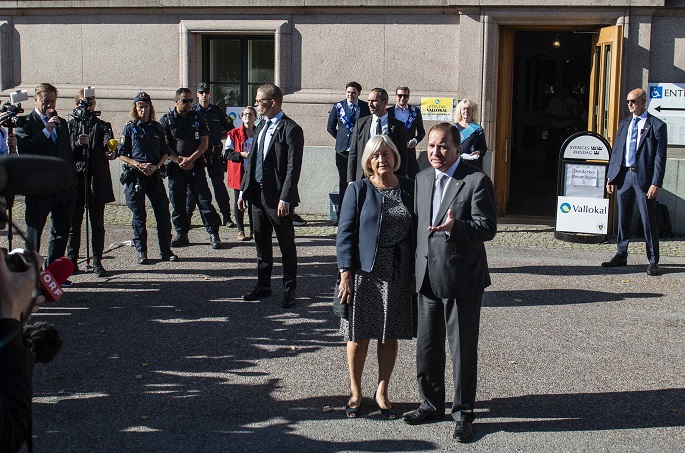Sweden faces complicated govt negotiations after polls
Published : 11 Sep 2018, 01:09
The Swedish elections have ended in a nearly deadlock between the left and right political blocs, leaving the nationalist Sweden Democrats in a kingmaker position, preliminary votes counting showed on Monday.
The final tally is not expected until the end of the week when early votes and overseas ballots are counted. But results from all of Sweden's 6,004 districts showed on Monday that the center-left and center-right blocs had roughly 40 percent each of the vote, meaning neither garnered a majority. Prime Minister Stefan Lofven's left bloc holds just a one-seat lead over the opposition Alliance.
"This evening ought to be the funeral for bloc politics," Lofven said in his Election Night speech, defying demands from the Alliance for his resignation and calling instead for collaboration across the political divide. But on Monday, the opposition leader, Ulf Kristersson of the Moderate Party, took to Instagram to declare that his center-right bloc will seek to form a government together.
Common for all parties within the two blocs is that they have all vowed not to collaborate with the Sweden Democrats.
Sweden Democrat leader Jimmie Akesson told Swedish media that he would like to form a government with the Moderate Party and the Christian Democrats, an invite that has not been accepted.
Lofven, on his part, has invited the Center Party and the Liberals to form a government with him, but the three parties do not have enough mandates to achieve a majority.
"It could take weeks or even months" before Sweden has a new government in place, the Social Democrats' parliamentary group leader Anders Ygeman told Swedish media on Monday as the party leadership gathered to discuss a way forward.
While the Social Democrats did not fare as bad as late opinion polls had indicated, with just 28.4 percent of the vote the result was still a historical low for the party that was once synonymous with the Swedish welfare state.
The Social Democrats' coalition partner, the Green Party, ended at 4.3 percent in the preliminary tally, just above the 4 percent electoral threshold. The Left Party did comparatively well, up from 5.7 percent in the 2014 election to 7.9 percent.
Akesson declared his party as the election's "biggest winner" after it gained 17.6 percent, cementing its position as Sweden's third biggest party.
However, while the Sweden Democrats made the biggest advances of all eight parliamentary parties, the results were not as positive as opinion polls had predicted. Throughout the election campaign, the Sweden Democrats predicted they would be the second biggest, if not the biggest, party.
Still, the Sweden Democrats could be political kingmakers, a position they are likely to take maximum advantage of, according to Swedish Television's political commentator. They will play an important role in what looks set to be a complicated and protracted process to form a new government.
The center-left bloc has the Social Democratic Party, the Green Party and Left party, while the opposition center-right alliance bloc has the Moderate Party, the Centre Party, the Liberal Party and the Christian Democrats.


